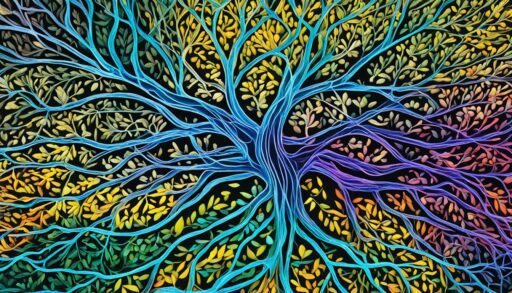Psychology of Aromachology

Imagine entering a space where the subtle fragrance of jasmine elevates your mood, or a whiff of citrus energizes your spirit. This isn’t magic; it’s the fascinating world of aromachology, where scent psychology and olfactory science come together to enhance your emotional well-being through scent. As you explore the nuanced terrain of fragrance therapy and aroma therapy, you’ll discover how the aromas you inhale can lead to profound changes in mood enhancement and offer a sensory getaway to tranquility and joy.
Delving into the essence of scents, you start to understand that each fragrance holds the key to unlocking a spectrum of emotions. With every breath, you’re inviting the power of aromachology to craft your own unique emotional experience, one scent at a time. Ready to embark on a journey that tantalizes your senses and nurtures your soul? Let’s inhale the future of personal wellness through the art of aroma.
What is Aromachology and Its Origins in Wellness
You might wonder about the origins of aromachology and how it came to be a pivotal aspect of wellness. The term, first coined by the Sense of Smell Institute in the late 80s, delves into the aromatic psychology behind our reactions to different scents. The science of aromachology distinguishes itself by primarily focusing on the influence of odors on behavior, recognizing how deeply scents can affect us on an emotional level.
A significant factor in aromachology’s approach is understanding how scents interact with the limbic system and scent recognition. The limbic system, an intricate network within our brain, acts as the command center for emotional and behavioral responses when we encounter various odors. Through aroma marketing, businesses have capitalized on this connection by curating environments that can potentially alter customer experience and behavior in positive ways.
Here’s a breakdown of how critical aspects of aromachology play a role in evoking these sensory responses:
- **Natural vs. Synthetic Scents:** Exploring different types of scents and their unique effects on mood and emotions.
- **Emotional Well-being:** Understanding how fragrances can induce states of relaxation, alertness, or happiness.
- **Behavioral Influence:** Decoding the sophisticated way smells can alter our perception and potentially influence our actions.
The study of aromachology is not just a theoretical field but one with practical applications that can enhance both personal well-being and business environments. As you delve deeper into the wonders of aromachology, keep in mind how the distinct fragrances you encounter influence your daily life.
The Fascinating Link Between Scents and Emotions
When you inhale a fragrance, it’s more than just a sensory experience; it’s a deep dive into the powerful world of fragrance psychology. The scents wafting through the air can do more than just please your olfactory senses—they have the unique capability to evoke memories, influence your emotional state, and even drive your behaviors in nuanced ways.
Understanding the Olfactory System’s Role in Aromachology
Your olfactory system is a portal to the limbic system, the brain’s emotion center, making every breath laced with scent a potential trigger for emotional responses. The science of aromachology taps into this intimate connection, studying how olfactory stimuli modulate the chemistry of your brain, resulting in feelings that can range from profound relaxation to heightened alertness.

The biology behind this fascinating interplay is rooted in the detection of olfactory stimuli by receptors in your nose, which then transmit signals directly to the limbic system. This is where the alchemy of turning smells into sentiments occurs, influencing your scent-induced behaviors in ways you may not even be consciously aware of.
Emotional Responses to Aromatic Stimuli
Imagine walking into a room and being greeted by the uplifting zest of lemon or the tranquil essence of lavender. Such aromatic stimuli are known to produce distinct emotional reactions, where lemon invigorates your senses, possibly reducing stress, and lavender tends to calm, which can help in creating a more relaxing environment.
The potency of a scent can be so significant that it goes beyond temporary mood alterations; it can affect interpersonal interactions and even work performance. Fragrances have the subtle power to foster an environment conducive to productivity, creativity, and social harmony.
Case Studies: Scent-Induced Feelings and Behaviors
Real-world scenarios underscore the role scents play in shaping our experiences. Office settings often utilize fragrance distribution systems to maintain a focused atmosphere, and case studies have shown that certain scents, like jasmine, are not merely pleasant but also aid in enhancing problem-solving skills.
Moreover, retailers have long harnessed the knowledge of fragrance psychology to affect shopping behaviors, creating an olfactory experience that can potentially encourage consumers to linger longer and make positive purchasing decisions.
“Nothing revives the past so completely as a smell that was once associated with it.” – Vladimir Nabokov
Understanding the olfactory system and its connections to the limbic system provides us with valuable insights into the overarching impact of scents on our emotions and behavior. Through strategic applications in both personal care and business environments, the lessons from fragrance psychology continue to carve a niche in sensory marketing and wellness practices.
Aromachology vs. Aromatherapy: Defining the Differences
As you begin to explore the vast world of scents, it’s essential to distinguish between aromachology and aromatherapy. While both practices harness the power of scent, they differ in methodology and objective. Aromatherapy is a time-honored approach that uses essential oils to promote holistic health, with roots tracing back to Ancient Egypt. Aromachology, a more recent term established by The Fragrance Foundation and the Sense of Smell Institute, concentrates on the psychological effects of scents, encompassing both natural and synthetic scents.
Understanding the nuances between these two practices can enhance your well-being journey. Appreciate the therapeutic benefits of aroma therapy, which aims to improve physical and psychological health through the meticulous blending of oils. Simultaneously, explore fragrance therapy through aromachology to decode the emotional language of perfumes and fragrances that surround you.
Let’s look into a comparative analysis to elucidate these differences more clearly:
| Aromatherapy | Aromachology |
|---|---|
| Utilizes purely essential oils | Studies both natural and synthetic scents |
| Focuses on therapeutic healing | Examines the impact on mood and emotions |
| Linked with physical wellness | Linked with emotional and behavioral responses |
| Techniques include massage, topical application, and inhalation | Techniques include scent diffusion and personal scent products |
| Often combined with holistic practices like yoga and meditation | Applied in diverse sectors including marketing, product design, and personal use |
Whether you’re drawn to the traditional aspects of aroma therapy or the modern insights provided by fragrance therapy, understanding the purpose and application of both can lead to a more profound appreciation and application in your pursuit of well-being.
The Science of Scent: How Aromas Influence the Brain
Delving into the realm of scent marketing, it’s fascinating to understand how odors travel via olfactory pathways to trigger profound neurological impacts in our brains. Scents, those invisible allurements, have the power to sway our mental state significantly. Imagine walking into a room awashed with the scent of lavender and feeling an immediate sense of calm. This isn’t happenstance; it’s the neurotransmitter release instigated by the fragrance engaging a delicate, orchestrated dance within your brain.

A deeper dive into the neurological impacts of aroma reveals that scent has the ability to enhance our day-to-day experiences — from the focus achieved with a whiff of peppermint to the relaxation that follows the earthy tones of sandalwood. Let’s break down the science bit by bit.
| Aroma | Triggered Neurotransmitter | Effect on Mental State |
|---|---|---|
| Citrus | Dopamine | Elevates mood, increases concentration |
| Rosemary | Norepinephrine | Improves memory retention, alertness |
| Lavender | Serotonin | Calms the mind, reduces anxiety |
| Vanilla | Endorphins | Boosts happiness, soothes stress |
The discussion about olfactory impacts doesn’t stop at personal experiences; it extends into the realms of branding and environments. Through scent marketing, brands can curate sensory experiences that resonate with consumers, translating into enhanced brand recognition and emotional connection.
So, the next time you catch a pleasant fragrance and find your spirits lifting, take a moment to appreciate the complex olfactory mechanisms at play, transforming mere scents into powerful conduits of emotion and memory.
Practical Aromachology: Creating Personalized Fragrances
The craft of personalized fragrances brings the essence of aromachology into a tangible form, catering to individual scent preferences and enabling self-expression through scent. In this digital age, bespoke perfumery is more than just a luxury; it’s a form of identity, a narrative woven through the notes of a custom fragrance specifically tailored for you.
The Art of Tailoring Scents to Individual Preferences
Imagine walking into a perfumery, where the scent artist understands your personality and crafts a fragrance that resonates with your spirit. This intimate process involves a deep understanding of how different notes complement your body chemistry, your moods, and even your memories.
The Rise of Bespoke Perfumery in Empowering Self-Expression
Bespoke perfumery is blossoming into a significant trend, championing the idea that a fragrance should be as unique as the individual wearing it. This practice empowers wearers to control the narrative of their own olfactory signature, turning a daily ritual into a form of personal storytelling.
| Benefits of Personalized Fragrances | Aspects of Bespoke Perfumery |
|---|---|
| Enhanced emotional connection | Collaborative creation process |
| Reflection of individuality | Tailored to personal scent preferences |
| Memory triggers | Inclusion of rare and exotic essences |
| Unique gift ideas | Use of high-quality ingredients |
The fusion of personalized fragrances and bespoke perfumery underscores a transformation in the way we perceive and use scents. Not confined to predetermined selections, you’re invited to explore and deploy a scent that is truly your own. This is the ultimate form of self-expression through scent, a personal brand that lingers in rooms and memories, long after you’ve gone.
Aromachology in Marketing: The Power of Sensory Branding
Imagine stepping into a space where the air whispers the essence of comfort, luxury, or freshness, subtly influencing your perception of the brand before you. This is the power of sensory branding, a key component in aroma marketing, where the intentional use of scents can forge a memorable consumer scent experience. It’s not just about the fragrance, but the emotional landscape it paints, fostering a connection between you and the brand—a tactic rooted deeply in olfactory branding.
When it comes to aroma marketing, certain fragrances can encourage you to linger longer, enjoy the ambiance, and form positive associations with a brand. This strategic incorporation of scents into the branding mix can transform a casual shopper into a loyal customer. Let’s delve into the specifics.
| Branding Element | Impact of Scent | Consumer Experience |
|---|---|---|
| Brand Identity | Creates a unique, olfactory logo | Memorable and distinctive brand recognition |
| Brand Atmosphere | Enhances the ambiance | Feels more immersive and engaging |
| Emotional Connection | Evokes specific moods or feelings | Establishes a deeper, emotional bond with the brand |
| Customer Retention | Positive scent associations encourage return visits | A sense of familiarity and comfort |
| Purchase Behavior | Can trigger impulse purchases or product exploration | Enriched shopping experience leading to satisfaction |
As you can see, the complexity of aroma marketing goes beyond mere pleasant smells. It’s a science, an art, and a powerful tool that brands use to communicate with you beyond visuals and sounds. Whether you’re shopping, relaxing in a hotel lobby, or working out at the gym, the curated fragrances envelop you, enhancing each moment with an invisible, yet tangible narrative.
So next time you’re captivated by an enchanting scent at your favorite store, remember that it’s a carefully crafted aspect of the store’s identity, designed to make your shopping adventure all the more pleasurable. Olfactory branding is not just a fleeting trend; it’s a testament to the profound connection between our sense of smell and our most profound memories and emotions, amplifying the consumer scent experience in a way that truly resonates.
Exploring the Therapeutic Potential of Aromachology
As we delve deeper into the transformative effects of scents, the therapeutic potential of aromas becomes increasingly apparent. Whether it’s the calming aura of lavender or the stimulating zest of citrus, fragrances carry remarkable power in enhancing psychological and physical well-being. Fragrance psychology isn’t just about smelling good—it’s about feeling good, too.
Research on Aroma Therapy: From Relaxation to Cognitive Enhancement
The realm of aroma therapy goes beyond mere relaxation techniques; it reaches into the territory of cognitive enhancement. With each inhalation, certain scents can sharpen your mind, increase alertness, and potentially improve memory retention. Through the diligent work of researchers, we’re starting to understand which fragrances can give you an edge in mental performance.
Fragrance Psychology and Its Impact on Well-being
Your olfactory sense can be a gateway to elevated moods and a heightened sense of well-being. Connecting specific scents with positive mental states ushers in a powerful dimension of well-being through scent. It presents a natural and accessible avenue to foster balance and harmony within your daily life.
| Scent | Therapeutic Benefits | Common Uses |
|---|---|---|
| Lavender | Calming, Reduces Stress | Sleep Aids, Relaxation |
| Peppermint | Increases Concentration | Work and Study Environments |
| Rosemary | Boosts Memory | Cognitive Enhancement |
| Chamomile | Promotes Relaxation | Stress Relief, Pre-Sleep Routine |
In conclusion, integrating these scents into your routine can tap into the therapeutic potential of aromas, potentially altering your cognitive and emotional landscape. Whether you choose to diffuse essential oils, light scented candles, or carry a pocket-sized aroma inhaler, you’re embracing an age-old wisdom that promotes a better quality of life holistically. Explore fragrance psychology and discover how a whiff of nature’s essence can uplift your day-to-day experiences.
Incorporating Aromachology into Daily Life
As the day unfolds, the subtleties of scent can transform mundane routines into moments of tranquillity and vigor. By integrating aromachology into your day-to-day activities, you tap into an innate capacity to revitalize your spirit and soothe tension. Establishing daily scent rituals offers a simple yet profound method to elevate your well-being and create an oasis of calm or a wellspring of energy, depending on the fragrance selected. Aromas like lavender are praised for their stress relief properties, while fragrances such as eucalyptus evoke rejuvenation through scents, providing a personalized therapeutic encounter with each inhalation.
Designing Scented Rituals for Stress Relief and Rejuvenation
Your home can be your sanctuary, a place where the right aroma can dispel worries and rejuvenate the mind and body. Imagine beginning your day with the invigorating aroma of peppermint to spark alertness, or unwinding in the evening with the serene essence of chamomile. By carefully curating your personal collection of scents, you build a repertoire of rituals to counter daily stressors and maintain emotional balance. The art of these practices lies in their simplicity and the personal touch they add to your lifestyle, making rejuvenation through scents a treasured part of your routine.
How to Use Aroma Marketing to Enhance Consumer Experience
In the realm of business, aroma marketing strategies are a testimony to the connection between scent and consumer behavior. As a business owner, you can optimize this sensory dimension to create a unique consumer scent experience. The ambient fragrance of your establishment can gently woo clients, setting the stage for a memorable brand interaction. Be it the comforting scent of vanilla in a bookstore or the crisp aroma of citrus in a boutique, these olfactory cues can subtly guide customer perceptions, enhance satisfaction, and indeed, influence purchasing choices. By fostering a sensorial bond, aroma marketing weaves a narrative for your brand that customers remember long after their visit.
Psychology of Aromachology
- Covalo – All About Aromachology: The Connection Between Fragrance & Psyche: blog.covalo.com – Discusses the psychology behind scents and their influence across various industries.
- Aja Botanicals – AROMACHOLOGY: WHERE SCENT MEETS PSYCHOLOGY: ajabotanicals.com – Explores the research on the power of scent to transform mood and mindset.
- Exploring Your Mind – Aromachology: What’s it All About?: exploringyourmind.com – Delves into the differences between aromatherapy and aromachology, focusing on how our nervous system reacts to various aromas.
- Aroma Designers – What is Aromachology & Why is Important for Scent Marketing?: www.aromadesigners.com – Examines the effect of smells on human behavior and the role of aromachology in scent marketing.
- Psychology Dictionary – What is AROMACHOLOGY?: psychologydictionary.org – Offers a definition and explanation of aromachology, focusing on its scientific study and its impact on psychology and fragrance technology.
